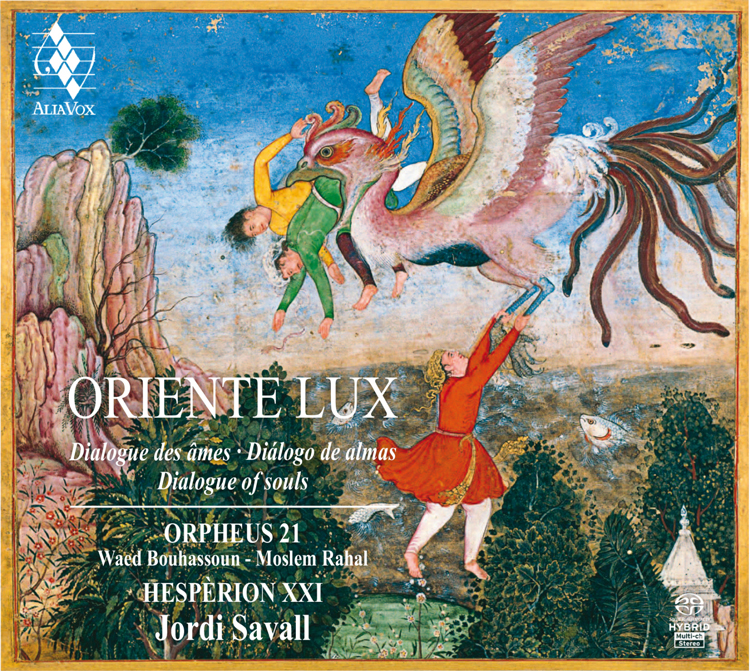Over the course of the past fifteen years, the illustrious Spanish conductor, composer, and virtuoso viol player, Jordi Savall, has embarked on a profound exploration of the intricate connections between Western and Eastern musical repertoires. Through this meticulous artistic journey, Savall seeks to foster a heightened sense of mutual comprehension and reverence for the diverse tapestry of cultures that enrich our global landscape.
On his latest album, “Oriente Lux,” the acclaimed ensemble Hespèrion XXI collaborates harmoniously with Orpheus 21, an ensemble founded by Savall himself in response to the migrant crisis, extending a warm embrace to musicians hailing from war-torn, famine-stricken, and disaster-ravaged nations. This collaboration, born out of a desire to draw attention to the shared dignity inherent in all humankind, is an eloquent testament to the indomitable power of music as a medium for unity and understanding.
The concept underlying Oriente Lux derives its inspiration from the prevailing medieval notion of an illuminating radiance emanating from the East. On this remarkable recording, Savall breathes life into this timeless idea, orchestrating a momentous convergence of musical traditions hailing from Syria, Bangladesh, Kurdistan, Afghanistan, Greece, Lebanon, Iraq, Morocco, Tunisia, and Turkey. The result is an exquisite auditory tapestry that transcends geographical boundaries, summoning forth a veritable feast of sounds, melodies, and harmonies that encapsulate the rich heritage of these vibrant cultures.
Savall’s unwavering commitment to championing the often marginalized and forgotten musical legacies of various populations is a defining facet of his artistic persona. His indefatigable endeavors in support of intercultural dialog are palpable, exemplified by his previous groundbreaking project, “The Routes of Slavery,” which was unveiled in 2015. Displaying an unyielding personal investment in the cause of refugee integration, Savall embarked on a transformative odyssey, delving into the heart of the notorious “jungle” in Calais on that fateful day of April 16, 2016. In a gesture of pure artistic spontaneity, he infused the desolate surroundings with the resplendent strains of his viola da gamba, harmonizing with the voices of the refugee musicians he encountered in that stark setting.
In the establishment of Orpheus XXI, Savall undertook the meticulous task of handpicking a formidable ensemble comprising eight exceptionally skilled musicians hailing from diverse origins, all possessing an unwavering dedication to the realms of musical practice and training. Through the intertwining of their prodigious talents, Savall forges a transcendent musical experience that serves as a testament to the boundless potential of collective artistic endeavor and cross-cultural harmony.
Tracks: CD 1
- Sadher Lau Banailo More Boiragi (Traditional song from Bangladesh)
- La rosa enflorece (Sefaradic traditional song )
- Mîrkut (Traditional song from Kurdistan)
- Ya Ghazaly (Traditional song from Syria)
- Michael Praetorius : Canarios
- Şeferdîn (Traditional religious song from Kurdistan)
- Al-bint el shalabiyya (Traditional song from Irak)
- Longa Riad (Farah Faza) Arabic instrumental (Riad Sombati, 1906-1981)
- Yâ habîbî (Traditional song from Syria)
- ‘Al maya, ‘Al maya (Traditional song from Syria)
Tracks: CD 2
- El Rey Nimrod (Traditional song from Israël)
- Sabiha (Traditional song from Syria)
- As for tall (Song from Lebanon (Marcel Khalife, 1950)
- Lamounî (Traditional song from Morocco and Tunisia)
- Laïli Djân (Traditional song from Afghanistan)
- Hal Asmar (Traditional song from Syria)
- Ya Mariam el bekr (Traditional song from Syria)
- Kevok (Traditional song and dance from Kurdistan)
- Apo xeno meros (Traditional song from Greece)
Apo xeno meros Traditional song from Greece
Üsküdar Traditional song from Istanbul
Improvisation – Traditional song from Bangladesh
Ghazali tal jàhri – Traditional dance from Morocco - ‘Al maya, ‘Al maya (Traditional song from Syria (bis))
Artistic Line-up
The musicians of Orpheus 21 number around 20 professional musicians of various origins who live in Europe (France, Spain, Germany, Belgium, Norway). Orpheus’ students following the Orpheus workshops may also join the ensemble. The size and nature of the ensembles is therefore variable, depending on the availability of venues and themes. In pursuit of its goals of bringing cultures together in dialog and a certain diversity in the repertoire, Orpheus 21 prioritize groups of more than 5 musicians.
Artistic Directors
Waed Bouhassoun (Syrian) oud and vocal
Moslem Rahal (Syrian) ney
Principal teachers in the Orpheus 21 project (members of Hespèrion XXI)
Waed Bouhassoun (Syrian) oud and vocal
Moslem Rahal (Syrian) ney
Dimitri Psonis (Greek) santur
Hakan Güngör (Turkish) qanun
Daud Sadozai (Afghan) rebab & sarod
Principal instructors in the Orpheus 21 project
Neşet Kutas, Azmari Nirjhar, Bashar Deghlawi,
Ruşan Filiztek (Saint-Denis workshop)
Dyar Mehrovi (Le Havre workshop)
Abu Gabi (Nantes workshop)
Rebal Alkhodari (Dortmund workshop)
Abazar Musa (Harstad workshop)
Musicians of Orpheus 21
Safi Al Hafez (Syrian) oud and vocal
Tarek Al Hammad (Syrian) vocal
Rebal Alkhodari (Syrian) oud and vocal
Shadi Al Moghrabi (Syrian) oud
Imad Amrah (Moroccan) cajón, percussion and vocal
Bashar Deghlawi (Syrian) darbuka and percussion
Georgi Dimitrov (Bulgarian) qanun
Hassan Elbili (Moroccan) vocal
Mojtaba Fasihi (Iranian) vocal
Ruşan Filiztek (Kurdish) saz and vocal
Abo Gabi (Syrio-Palestinian) vocal
Khalil Guerrow (Syrian) violin
ORIENTE LUX
Abdoul Hameed Sakhizada (Afghan) dambora and vocal
Hovhannes Karakhanyan (Armenian) duduk
Ibrahim Keivo (Syrian of Armenian origin) bouzouki, saz and vocal
Neşet Kutas (Kurdish) percussions
Anastasia Louniova (Belarusian) cymbalon
Modser Magdi Shaban (Sudanese) percussion
Gani Mirzo (Syrian) oud
Abazar Musa (Sudanese) vocal and guitar
Azmari Nirjhar (Bangladeshi) vocal
Yannis Papaioannou (Greek) violin
Walid Rafiq (Afghan) tablas
Maemon Rahal (Syrian) riq, qanun and percussion
Mostafa Taleb (Iranian) kamancha
Diyar Üren (Iraqi) saz and vocal
Radouan Zahir (Moroccan) oud and lotar
Choir
Children: Arpita Ahmed, Vlad Dimitru, David Dimitru, Mushfirat Hossain, Mahiyat Hossain, Elia Nouali, David Nouali (Saint-Denis workshop) Yacine Karboa (Vesoul workshop)
Young people: Semih Ali Aksoy, Yoness Erraki Choeur (Barcelona workshop) Muhammad Abou Ammash, Mhd Tayser Idlbi (Dortmund workshop) Omar Rodi Jamil (Harstad workshop)
Buy Oriente Lux


